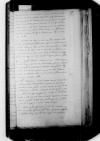List #5751
Alfonso de VALDÉS do Ioannes DANTISCUS[Madrid], [1528-08-19 — 1528-08-31]
Regest polski: Za radą przyjaciół Valdes zamierza posłać Erazmowi „bezwstydną książeczkę franciszkańską” [Luis Carvajal, Apologia vitae monasticae diluens nugas Erasmi, Salamanca, 1528], prosi więc Dantyszka o użyczenie egzemplarza, ponieważ chwilowo nie ma żadnego innego. Przesyłkę Erazmowi dostarczy posłaniec, który przywiózł list Erazma do Valdesa z 24 kwietnia [1528, list nienotowany przez Allena]. Valdes ubolewa, że nie ma czasu spotkać się z Dantyszkiem , chciałby mu bowiem opowiedzieć o akcji "papistów", dotyczącej jego „dialogu rzymskiego”.
Rękopiśmienne podstawy źródłowe:
Pomocnicze podstawy źródłowe:
Publikacje:
| ||||||||||||||||||||||
Tekst + aparat krytyczny + komentarz Zwykły tekst Tekst + komentarz Tekst + aparat krytyczny
Salutem.
Videtur omnino amicis omnibus impudentem illum cf. Luis de Carvajal, Apologia monasticae religionis diluens nugas Erasmi, Salamanca, 1528 ⌊libellum Franciscanumcf. Luis de Carvajal, Apologia monasticae religionis diluens nugas Erasmi, Salamanca, 1528 ⌋ mittendum esse ad
Tuus
[1 ] An unknown letter of Erasmus to Valdes

